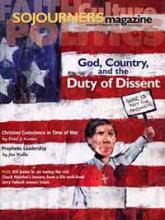Come to the Table
Invite your friends, pass the cookies, and dig into Sojourners. Table Talk discussion guides provide a gathering place for communities to discuss issues of faith, politics, and culturelocal and global. Table Talk offers a smorgasbord of questions (enough for four sessions, if you want to arrange it that way), as well as resources for further study and action. You bring dessert.
Download in Word or PDF format (requires Acrobat Reader) for copy-ready versions with fewer pages, or click "print this article" button on right.
Session I. Passing the Peace
"Prophetic Leadership" (p. 7)
"We Pledge Allegiance..." (p. 15)
"Patriotism is Not Enough'" (p. 20)
"Not a Just or Moral War" (p. 26)
"Overpower evil with good! Now that is a radical foreign policy," writes Peter Gomes. How are Christians responding to the U.S. plans for war against Iraq? Gerald Schlabach looks at Romans 12 and 13 as he explores what it means for Christians to call Jesus "Lord," while David Anderson outlines how churches are responding.
Questions to Consider
1. Do you find it difficult to "discern which of the many competing messages about Iraq are coming to you in good faith"? In what ways does your faith affect how you listen to the news?
Read the Full Article
